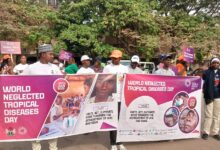WHO Trains 350 Nigerian Emergency Responders

In line with its effort to strengthen the country’s emergency preparedness and save lives, the World Health Organisation (WHO) has trained 350 Nigerian emergency responders.
The training, with theme: “Capacity Building, Learning and Training to On-Board the AVoHC SURGE Team” held on Monday, November 6, 2022 in Abuja.
Speaking at the opening ceremony of the training, WHO Nigeria country representative, Dr. Walter Mulombo stated that, preparation and early rapid execution of outbreak response strategies were critical in detecting, containing, and mitigating the spread of potentially dangerous infectious diseases.
He added that, enhancing Global Health Security (GHS) therefore, required holistic and coordinated sustained national and sub-national actions to ensure a faster and more equitable response
He informed that, in Nigeria, emergencies, disasters, and other crises increase in number and magnitude daily, affecting thousands of vulnerable and unprotected people with the situation not promising to improve soon.

Muloumbo said the ability to deliver an early and effective response required Government and institutions to be prepared collaboratively for new outbreaks; adding that, they must be ready to respond nationally, sub-nationally and locally before an attack became an epidemic or pandemic.
Going further, he explained that emergency workforce development was a critical domain that must be addressed to enhance Global Health Security and mitigate future Public Health Emergencies of International Concern (PHEIC).
Therefore, the response to public health emergencies required an adequate pool of dedicated, qualified, and experienced professionals.
One of the objectives of the training was to prepare a workforce that could be called upon when needed – drawn not only from the WHO but mainly from the States, civil society, and volunteers.
Participants included volunteers from the Federal Ministry of Health (FMoH), Nigerian Field Epidemiology and Laboratory Training Programme (NFELTP), State Ministry of Health (SMoH), Federal Ministry of Environment (FMoEnv), Ministry of Defense (MoD), Federal Ministry of Humanitarian Affairs Disaster Management and Social Development (FMHADMSD), National Agency for Food, Drug Administration and Control (NAFDAC), Nigerian Centre for Disease Control (NCDC), National Emergency Management Agency (NEMA), National Health Insurance Scheme (NHIA), Nigerian Police Force and University of Abuja Teaching Hospital.

On his part, the Minister of Health, Dr. Osagie Ehanire informed that each year, more than 100 health emergencies occurred in the African region accounting for close to 70% of all health emergencies globally.
Ehanire, who was represented by the Minister of State for Health, Hon. Joseph Nkama said, annually, Nigeria was affected by several health emergencies, including Lassa fever, cholera, yellow fever, meningitis e.t.c and the humanitarian crisis from insecurity and the impact of climate change such as recurring flood occurring in Kogi, Bayelsa and other states of the Federation.
He therefore appreciated WHO for organising the training session and pledged to make judiscious use of the opportunity for the betterment of the nation.






